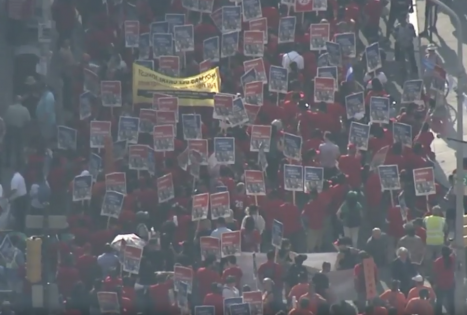by Paul Garver

Building Global Labor Solidarity in a Time of Accelerating Globalization. Edited by Kim Scipes. Haymarket Books, 2016.
I do not have any good reason for taking so long to review this valuable book. I picked it up only at the recent Labor Notes Conference after discussing it with Scipes there. Did I arrogantly believe think that after decades as a global labor activist that I had nothing new to learn? This collection of essays proves me wrong.
I have been acquainted with Kim Scipes since I invited him to join a mini-conference on international labor at the Blue Mountain Center in 1988. Once a US Marine, he became a sociologist and an activist in teachers’ and writers’ unions. Scipes was then, and remains, a tireless critic of the AFL-CIO’s international policies, writing numerous books and articles on the topic
Thirty years ago, I fully agreed with Scipes that the AFL-CIO’s international policy was unambiguously nefarious in its intentions and consequences of workers around the world. Under the strongly anti-Communist presidents George Meany and Lane Kirkland, the AFL-CIO turned over its field operations in its regional institutes mostly to members of the Social Democrats USA, a smallish sect stemming from the pro Vietnam War wing of the former Socialist Party. While paying verbal obeisance to free and democratic trade unionism, operatives of the AFL-CIO’S government-funded regional institutes tried to build pro-US union federations and from time to time supported right-wing coups and US military and political interventions.
In the 1980s my SEIU local leadership supported my involvement in union solidarity missions to Nicaragua, El Salvador and Guatemala. At the SEIU convention in Toronto in 1988, I helped organize a large group of local delegates that successfully put forth and negotiated a composite resolution on SEIU’s international policy that effectively replaced adherence to U.S. imperial policies with an emphasis on pragmatic solidarity with all global workers based on mutual interests in the globalized economy. Both the then SEIU President John Sweeney and the Left bloc of delegates asked me to introduce the report from the convention resolutions committee which had negotiated agreement on the new language, which following seconding speeches from both reformers and administration loyalists, was unanimously adopted by the Convention delegates.
A convention resolution does not immediately change union policy, and in any event international labor solidarity has never been high on SEIU’s list of priorities. But when John Sweeney became president of the AFL-CIO (following a contest with his former mentor AFL-CIO Secretary-Treasurer Tom Donahue who shared Lane Kirkland’s Cold War views), he allowed a slow evolution of the Federation’s policies towards pragmatic support for more autonomous and even militant labor movements overseas. The former regional groups that had promoted political anti-Communism were abolished in 1997, to be replaced by the American Center for International Labor Solidarity [“Solidarity Center”]. While still dependent on U.S. government funding, the Solidarity Center has developed credible programs to encourage independent union-building in several countries, ranging from Bangladesh and Cambodia through Haiti and the Dominican Republic to Egypt and Tunisia.
Thus the AFL-CIO followed the approach of long-standing union development agencies controlled by national union federations like those of Norway, Sweden, Denmark, the Netherlands and Germany, which made use of government funding to establish enduring partnerships with autonomous unions in developing countries. The International Union of Food Workers (IUF), a global union federation for which I worked from 1990-2006, accepted well vetted project funding controlled by its affiliated unions in European countries, while remaining very reluctant to accept any funding from the USA, except for dues-based direct funding from affiliated American unions. This was based upon very negative experiences that IUF affiliates had in the 1970s and 1980s with covert interference from AIFLD [American Institute for Free Labor Development] and other US regional labor institutes. However, this reluctance is slowly receding in recent years as experiences overseas unions have had with Solidarity Center programs have become generally positive. Most staffers of the Solidarity Center both in Washington and in its numerous field programs throughout the world now are recruited for their pragmatic skills in union building and appear ideologically committed to working towards a solidaristic global labor movement.
Organizing at the global level with the IUF convinced me that it was necessary and possible to organize workers from all parts of the world into effective networks within specific global corporations (I worked on this task with the IUF on Coca-Cola, Nestle and other global food and drinks corporations). This work is neither spectacular nor immediately effective, but in the long run lasting connections among workers based on mutual interests forged in face-to-face encounters do provide a counter-power to global capitalism.
The essays collected in this volume by Kim Scipes partially reflect this evolution. Scipes himself remains very skeptical that the AFL-CIO has actually changed its spots in any consistent or persistent direction. He cites both in this volume and in other writings, that the Solidarity Center in Venezuela supported a union whose leader briefly supported a coup against Hugo Chavez. He also cites the 2013 AFL-CIO convention at which resolutions against imperialist wars were blocked from the chair. His own conceptualization of global labor solidarity seems strongly rooted in an enduring belief that U.S. imperialism is by far the major obstacle to establishing global worker solidarity. He argues consistently that its almost exclusive reliance on U.S. government funding compromises the Solidarity Center. While he refers to the need to build global union and worker alliances against transnational capitalism and in specific global corporations and sectors, he does not feature it much in his own analysis.
In his essay “Building Global Solidarity Today: Learning from the KMU in the Philippines” Scipes presents what he considers to be a leading instance of a national union center (Kilusang Mayo Uno – May First Movement) practicing genuine trade unionism at home and abroad. Scipes attended “International Solidarity Affairs” programs conducted by the KMU in 1988 and 2015, also conducting some field research in the Philippines. I agree with Scipes that the KMU’s international efforts are commendable, but fear that in isolation such isolated efforts are insufficient to challenge capital at the global level.
To his credit, Scipes includes several superb essays by contributors who have fresh and compelling insights into major global labor issues that they elaborate in considerable detail.
Timothy Ryan has been Asia regional director of the Solidarity Center since 2001, after serving as a field representative in Sri Lanka and Indonesia. His essay, “It Takes More than a Village” is a comprehensive analysis of how technical training in organizing and collective bargaining [assisted by the Solidarity Center field office] combined with external leverage through links with consumer organizations in Europe and North America over a long stretch of time enabled the beginnings of union organization among garment workers in Bangladesh, following the Rani Plaza building collapse and factory fires that killed so many workers. Ryan’s essay exemplifies how global campaigns that actually empower rank-and-file workers can be built against tremendous political and economic opposition. Scipes shows admirable generosity in including this essay by a key officer of an organization that he in principle disapproves.
Mike Zweig’s “Working for Global Justice in the New US Labor Movement” draws upon his own active involvement in US Labor against the War [USLAW] both to describe some new and tentative steps US unions have taken to oppose wars and support unionists in Iraq. He favorably cites the reform of the Solidarity Center. Where Scipes sees a glass mostly empty at the AFL-CIO, Zweig sees it as partially full. However Zweig at the same time calling for a new culture of independent labor politics that would provide a more secure foundation for deep reform of the US labor movement.
David Bacon’s “Building a Culture of Solidarity across the US-Mexican Border” is based on his own extensive knowledge as a journalist and photographer working on both sides of the border. He develops a convincing case that the most organic and powerful link between the progressive movements of Mexico and the United States consists in the Mexican workers and families who live and work in both countries. Bacon cites the solidarity work of the United Steelworkers (USW) with the Mexican unions SME and ‘los Mineros”, which is based both on actions against common multinational employers, and on the community and family ties among workers. [Ben Davis, first at the Solidarity Center in Mexico and later at the USW International Department, has facilitated this ongoing connection].
Finally for a fresh perspective I recommend Jenny Jungehülsing’s “Building Bridges Between the Labor Movement and Transnational Migration Research”, which draws out the potential for international solidarity based on ties among migrants. Her case studies include the USW-Los Mineros relationship as well as the ongoing relationship between the Salvadoran members of the LA-based SEIU Service Workers West local and the FMLN in El Salvador.
In conclusion, if you have any interest in building global labor solidarity, buy and read this book. It is currently available from Haymarket Books for $9.50 (PB plus e-book) or $5.00 (e-book only).
Filed under: Book Reviews, Global organizing, Immigrant Workers, Solidarity, Uncategorized | Tagged: AFL-CIO, Scipes | Leave a comment »




 Trade officials are racing to complete their renegotiation of the North American Free Trade Agreement (NAFTA) within the coming weeks — and, not suprisingly, corporate lobby groups are pushing hard to ensure that NAFTA provisions that make it easier to outsource jobs, drive down wages and pollute the environment are maintained.
Trade officials are racing to complete their renegotiation of the North American Free Trade Agreement (NAFTA) within the coming weeks — and, not suprisingly, corporate lobby groups are pushing hard to ensure that NAFTA provisions that make it easier to outsource jobs, drive down wages and pollute the environment are maintained.
 LACLAA ( Labor Committee for Latin American Advancement) organized a dynamic demonstration today at the ICE offices in Sacramento to oppose the policies of jailing children and to slow down ICE. Photos, videos, and sound recordings contributed to the scene.
LACLAA ( Labor Committee for Latin American Advancement) organized a dynamic demonstration today at the ICE offices in Sacramento to oppose the policies of jailing children and to slow down ICE. Photos, videos, and sound recordings contributed to the scene.








 As Co Chair of DSA’s Immigrants’ Rights Committee I testified on May 29 to the Sacramento County Board of Supervisors to not renew an existing contract with ICE to use the Sacramento County Jail to hold immigrants. California, and Sacramento, is already a Sanctuary state/county.
As Co Chair of DSA’s Immigrants’ Rights Committee I testified on May 29 to the Sacramento County Board of Supervisors to not renew an existing contract with ICE to use the Sacramento County Jail to hold immigrants. California, and Sacramento, is already a Sanctuary state/county.


